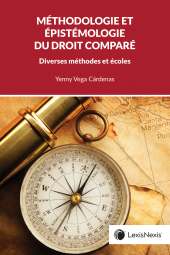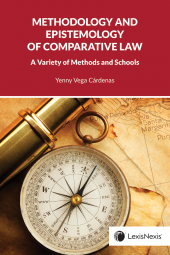Methodology and Epistemology of Comparative Law: A Variety of Methods and Schools
One Year Subscription Only Terms
Subscribers receive the product(s) listed on the Order Form and any Updates made available during the annual subscription period. Shipping and handling fees are not included in the annual price.
Subscribers are advised of the number of Updates that were made to the particular publication the prior year. The number of Updates may vary due to developments in the law and other publishing issues, but subscribers may use this as a rough estimate of future shipments. Subscribers may call Customer Support at 800-833-9844 for additional information.
Subscribers may cancel this subscription by: calling Customer Support at 800-833-9844; emailing customer.support@lexisnexis.com; or returning the invoice marked 'CANCEL'.
If subscribers cancel within 30 days after the product is ordered or received and return the product at their expense, then they will receive a full credit of the price for the annual subscription.
If subscribers cancel between 31 and 60 days after the invoice date and return the product at their expense, then they will receive a 5/6th credit of the price for the annual subscription. No credit will be given for cancellations more than 60 days after the invoice date. To receive any credit, subscriber must return all product(s) shipped during the year at their expense within the applicable cancellation period listed above.
Product description
Methodology and Epistemology of Comparative Law: A Variety of Methods and Schools identifies best practices to successfully venture into the world of comparative legal analysis, whether it be in private practice, the public sector, or academia.
The text explores the origins and objectives of comparative law and explains the different levels of legal comparison. It then reviews the schools and methods that are currently in use worldwide. After illustrating the methods developed by a variety of comparatists, the author then proposes a new approach: decolonization of the law. Finally, a step-by-step roadmap is provided to assist the reader in formulating a structured comparative research project, allowing them to reach the objectives initially developed.
This comprehensive text is the product of years of research and teachings in Canada, at the Max Planck Institute for Comparative and International Private Law in Hamburg (Germany), as well as at the Universities of Doshisha (Japan), Padua (Italy), Helsinki (Finland), Oslo (Norway), and many Latin-American Universities in Colombia, Costa Rica, Ecuador and Mexico. This book therefore offers a pluralistic, diverse, and multicultural perspective on comparative law.
Table of contents
Preface
Introduction
Chapter 1: Epistemology and Methodology of Comparative Law
Chapter 2: Different Levels of Legal Comparison
Chapter 3: Functional Method (German School)
Chapter 4: Structural Method (Italian School)
Chapter 5: Interdisciplinary Method in Comparative Law (Nordic School)
Chapter 6: Decolonial Comparative Law’s Method (Global South School)
Chapter 7: Other Methodological or Alternative Approaches
Chapter 8: Step-by-Step Roadmap: How to Compare?
Conclusion
References
List of Figures
Index
Related products
-
 Extractive Industries and Human Rights in an Era of Global Justice: New Ways of Resolving and Preventing ConflictsRelease date: April 29, 2019$215.00
Extractive Industries and Human Rights in an Era of Global Justice: New Ways of Resolving and Preventing ConflictsRelease date: April 29, 2019$215.00 -
 Méthodologie et épistémologie du droit comparé : Diverses méthodes et écolesRelease date: July 10, 2024$100.00
Méthodologie et épistémologie du droit comparé : Diverses méthodes et écolesRelease date: July 10, 2024$100.00 -
New!
 Cook on Costs 2025New!Release date: November 20, 2024$662.65
Cook on Costs 2025New!Release date: November 20, 2024$662.65
 Lexis Nexis
Lexis Nexis 